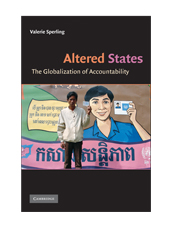Book contents
- Frontmatter
- Contents
- Acknowledgments
- 1 Transnational Institutions and Accountability
- 2 For Richer, for Poorer: Economic Globalization
- 3 Democracy from Abroad? Political Globalization
- 4 Army for Hire: Transnational Military Forces
- 5 Trials and Tribulations: Transnational Judicial Institutions
- 6 My Country Is the Whole World: Transnational Civil Society
- 7 Conclusion: Altered States and Altered Citizens
- Bibliography
- Index
1 - Transnational Institutions and Accountability
Published online by Cambridge University Press: 19 January 2010
- Frontmatter
- Contents
- Acknowledgments
- 1 Transnational Institutions and Accountability
- 2 For Richer, for Poorer: Economic Globalization
- 3 Democracy from Abroad? Political Globalization
- 4 Army for Hire: Transnational Military Forces
- 5 Trials and Tribulations: Transnational Judicial Institutions
- 6 My Country Is the Whole World: Transnational Civil Society
- 7 Conclusion: Altered States and Altered Citizens
- Bibliography
- Index
Summary
In an early scene of the 1987 film Roxanne, Steve Martin places some coins into a newspaper box on the street, pulls out a paper, glances at the front page, and shrieks in horror. He digs furiously in his pocket, presses more change into the slot, opens the box, and hurriedly shoves the offending newspaper back inside. My desire to write this book was driven by similar sentiments.
A glance at the “international” section of any major daily newspaper tends to reveal stories of war-related losses, devastating poverty, corrupt and abusive government, and social injustice in myriad forms. Dictators throw dissidents into prison cells and torture them. Men with guns rape and murder civilian women in Iraq, Somalia, Liberia, Bosnia, and too many other states. Women with rusted razors scrape off little girls' genitals. Frustrated jihadists fly airplanes into buildings. And every day, approximately 4,900 more children under age five perish from disease borne by the lack of clean water and sanitation.
I found the news rather depressing. The committers of violence, the enforcers of injustice, and the promoters of poverty were often anonymous and frequently got off the hook. Sometimes they were locals, citizens of the states in which they committed their human rights violations; often, they represented the state itself. Other times, the problem seemed to originate beyond a state's borders, traceable to a transnational agency, an amorphous global ideology, an absence of empathy.
- Type
- Chapter
- Information
- Altered StatesThe Globalization of Accountability, pp. 1 - 19Publisher: Cambridge University PressPrint publication year: 2009



